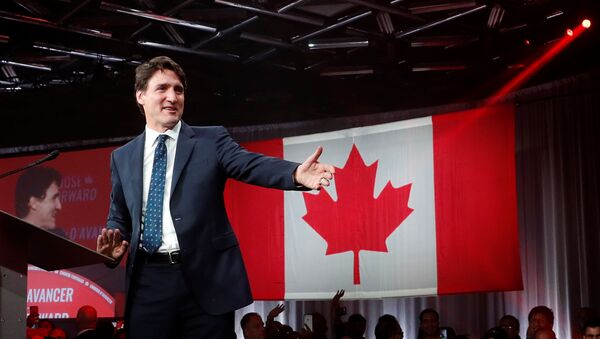Stephen R. Nagy, Senior Associate Professor, Division of Arts and Sciences, College of Liberal Arts, at the International Christian University, has shared his views on the results of the 43rd Canadian elections.
Sputnik: Before the election, NDP Leader Jagmeet Singh stated that he would try to form a coalition government with other parties if the Conservatives win the most seats in the election, but fail to secure a majority. But now, since the Liberal Party has to form the minority government, how likely is it that NDP forms a coalition with the Liberals?
Stephen Nagy: The priority of the NDP leader Jagmeet Singh, as well as other parties, is to ensure that Conservative leader Andrew Scheer does not become the next PM. For the NDP, the Conservative agenda represents steps backwards in terms of Canada's social welfare system, commitment to the environment, and on progressive issues such as diversity and inclusion. With that in mind, the NDP will likely partner with the Liberal Party to form a coalition and place these core values front and centre of the coalition government.
Sputnik: How likely is it that the Liberal Party forms a coalition with NDP or Bloc Québécois?
Stephen Nagy: The Bloc Québécois could likely support either, but it would likely be able to extract more concessions from a liberal coalition over an NDP coalition.
Sputnik: It has been four years since Justin Trudeau declared that the federal election of that year would be the last conducted under the first-past-the-post system. Why did the Liberals abandon electoral reform? Are there any chances that now they will keep their past promises?
Stephen Nagy: The abandonment of the liberal party pledge is obvious, they want to remain in government, and they feel that their agenda has not been fully realised. Likely, the proposal will be shelved until the liberals can have nationwide appeal or a new government is formed by the conservatives in a future election.
Sputnik: The Bloc Québécois unexpectedly outperformed the NDP, which according to polls, was in third place in terms of the number of voters. What do you think is the reason for the success of the Bloc Québécois?
Stephen Nagy: The Bloc has had a resurgence over the past several years. Analysts believe that this is related to socio-economic inequalities compared with English speaking provinces. At a strategic level, Trudeau's weakness was seen as an opportunity by the bloc to push for a "Quebec first" agenda that resonates with many Quebec residents in an era that we see nationalist movements globally.
Sputnik: According to an investigation by Canada's ethics commissioner, Trudeau violated ethics law in the SNC-Lavalin case. Do you think this case could somehow develop further? Should the public expect other Trudeau-related scandals during his tenure as prime minister?
Stephen Nagy: Conservative voters are livid about the SNC-Lavalin case and feel that Trudeau has not been fully transparent about this. Notwithstanding, the country is divided about their impression of PM Trudeau and detractors will likely try to dig up more potentially scandalous accusations to further delegitimate PM Trudeau. In this sense, we are seeing a form of US politics with opposition parties attempting to find any reason to remove the PM.
Sputnik: What significant foreign policy steps should be expected from the Trudeau administration during the next four years?
Stephen Nagy: Foreign policy priorities are threefold: stabilising and strengthening Canada US relations, resetting Canada China relations, and turning Canada into an energy exporter.



